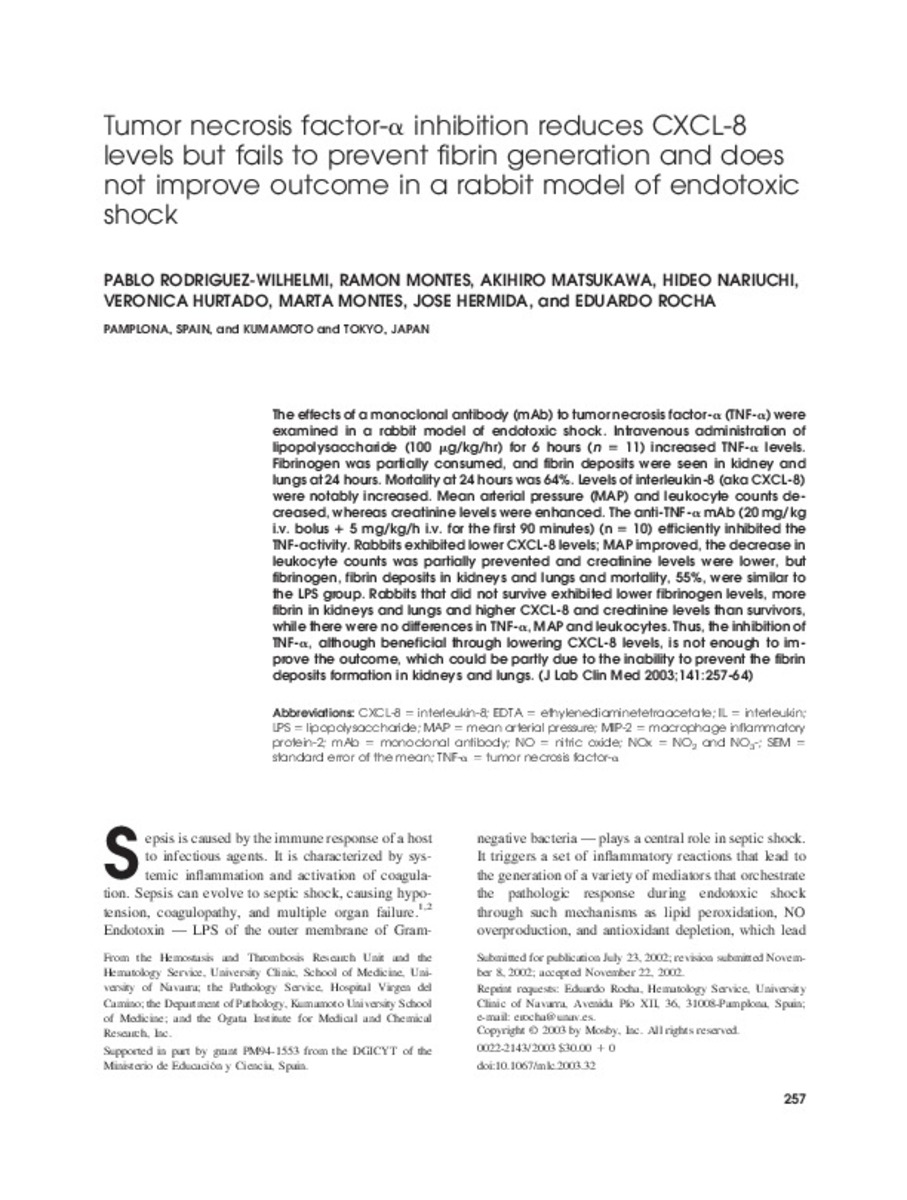Full metadata record
| DC Field | Value | Language |
|---|---|---|
| dc.creator | Rodriguez-Wilhelmi, P. (Pablo) | - |
| dc.creator | Montes, R. (Ramón) | - |
| dc.creator | Matsukawa, A. (Akihiro) | - |
| dc.creator | Nariuchi, H. (Hideo) | - |
| dc.creator | Hurtado, V. (Verónica) | - |
| dc.creator | Montes, M. (Marta) | - |
| dc.creator | Hermida, J. (José) | - |
| dc.creator | Rocha, E. (Eduardo) | - |
| dc.date.accessioned | 2012-05-18T17:14:13Z | - |
| dc.date.available | 2012-05-18T17:14:13Z | - |
| dc.date.issued | 2003 | - |
| dc.identifier.citation | Rodriguez-Wilhelmi P, Montes R, Matsukawa A, Nariuchi H, Hurtado V, Montes M, et al. Tumor necrosis factor-alpha inhibition reduces CXCL-8 levels but fails to prevent fibrin generation and does not improve outcome in a rabbit model of endotoxic shock. J Lab Clin Med 2003 Apr;141(4):257-264. | es_ES |
| dc.identifier.issn | 1532-6543 | - |
| dc.identifier.uri | https://hdl.handle.net/10171/22117 | - |
| dc.description.abstract | The effects of a monoclonal antibody (mAb) to tumor necrosis factor-alpha (TNF-alpha) were examined in a rabbit model of endotoxic shock. Intravenous administration of lipopolysaccharide (100 microg/kg/hr) for 6 hours (n = 11) increased TNF-alpha levels. Fibrinogen was partially consumed, and fibrin deposits were seen in kidney and lungs at 24 hours. Mortality at 24 hours was 64%. Levels of interleukin-8 (aka CXCL-8) were notably increased. Mean arterial pressure (MAP) and leukocyte counts decreased, whereas creatinine levels were enhanced. The anti-TNF-alpha mAb (20 mg/kg i.v. bolus + 5 mg/kg/h i.v. for the first 90 minutes) (n = 10) efficiently inhibited the TNF-activity. Rabbits exhibited lower CXCL-8 levels; MAP improved, the decrease in leukocyte counts was partially prevented and creatinine levels were lower, but fibrinogen, fibrin deposits in kidneys and lungs and mortality, 55%, were similar to the LPS group. Rabbits that did not survive exhibited lower fibrinogen levels, more fibrin in kidneys and lungs and higher CXCL-8 and creatinine levels than survivors, while there were no differences in TNF-alpha, MAP and leukocytes. Thus, the inhibition of TNF-alpha, although beneficial through lowering CXCL-8 levels, is not enough to improve the outcome, which could be partly due to the inability to prevent the fibrin deposits formation in kidneys and lungs. | es_ES |
| dc.language.iso | eng | es_ES |
| dc.publisher | Elsevier | es_ES |
| dc.rights | info:eu-repo/semantics/openAccess | es_ES |
| dc.subject | Antibodies, Monoclonal/pharmacology | es_ES |
| dc.subject | Fibrin/metabolism | es_ES |
| dc.subject | Interleukin-8/metabolism | es_ES |
| dc.subject | Shock, Septic/metabolism | es_ES |
| dc.subject | Tumor Necrosis Factor-alpha/antagonists & inhibitors | es_ES |
| dc.title | Tumor necrosis factor-alpha inhibition reduces CXCL-8 levels but fails to prevent fibrin generation and does not improve outcome in a rabbit model of endotoxic shock | es_ES |
| dc.type | info:eu-repo/semantics/article | es_ES |
| dc.relation.publisherversion | http://www.sciencedirect.com/science/article/pii/S0022214302930398 | es_ES |
| dc.type.driver | info:eu-repo/semantics/article | es_ES |
Files in This Item:
Statistics and impact
Items in Dadun are protected by copyright, with all rights reserved, unless otherwise indicated.






